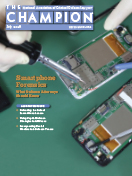July 2018

What are the basic methods for retrieving evidence from smartphones? What services can a social worker provide to the defense team?
Articles in this Issue
-
A Brief Tour of Smartphone Forensics: What Defense Attorneys Should Know and Expect
Smartphones can create a detailed record of what their users have been doing. Wisconsin litigator Peyton Engel focuses on the traits smartphones have in common with general-purpose computers and the implications from a digital evidentiary perspective. He discusses retrieving evidence from smartphones, extracting information from cloud storage, finding evidence of a secret or hidden phone, wearable tech, issuing subpoenas for social media records, and using apps to collect evidence.
-
Affiliate News
Affiliate News for July 2018 Champion
-
Book Review: End of Its Rope: How Killing the Death Penalty Can Revive Criminal Justice
Henry McCollum and Leon Brown each confessed to the horrific rape murder of an 11-year-old girl. They immediately recanted, but confessions being what they are, the two were tried, found guilty, and sentenced to die. They spent some 30 years in prison before being exonerated when DNA testing not only showed them innocent but also revealed the actual rapist/murderer.
-
Drinking from a Poisoned Chalice Post-9/11: Defending the Rule of Law in the Guantanamo Bay Military
In his Keynote Address at NACDL’s conference in Miami, Brigadier General John G. Baker, head of the Military Commissions Defense Organization (MCDO), shared his views regarding the events that have unfolded at Guantanamo Bay. General Baker, who supervises the defense teams, discussed some of the major issues facing the MCDO defense teams, saying that these issues “shine a light on why lawyering matters and what it truly means to be a criminal defense attorney.”
-
From the President: NDS Harlem: The Power of Public Defense
Holistic defense recognizes that the impact of a defendant’s case can extend beyond one practice area. This defense model assembles teams of lawyers by integrating practice areas and encouraging collaboration: a criminal defense lawyer sits next to a family law attorney and across from an immigration attorney.
-
Getting Scholarship Into Court Project
Getting Scholarship into Court Project, July 2018
-
Incorporating Social Workers into the Defense Team to Improve Outcomes in All Phases of Litigation
It is common for defense attorneys to hire experts in ballistics, fingerprints, accident reconstruction, identification, psychology, and numerous other fields. Often, however, social workers are absent from the list of common defense experts. They should not be. The opioid crisis, not to mention the ongoing debate about mass incarceration and mandatory minimum sentencing laws, and the growing awareness of the role that mental illness plays in confrontations with law enforcement, make this an auspicious time to push for incorporating social workers into the defense team. Social workers can provide may beneficial services to the defense team, and their contributions will vary from case to case. Broadly speaking, their services can be broken down into three categories: the psychosocial evaluation, program placement, and client interviews and management.
-
Informal Opinion: The Right to Counsel in the US: An International Perspective
In the United States, the right to counsel is considered so fundamental to a fair criminal justice system that it is constitutionally mandated through the Sixth Amendment. However, this noble value is elusive in too many places in the United States, often operating as an unfunded mandate.
-
Inside NACDL: NACDL’s Effort to Expose and Limit the Trial Penalty
Garners Broad Support with the Launch of a National Reform Effort
The “trial penalty” refers to the substantial difference between the sentence offered in a plea offer prior to trial versus the longer sentence a defendant receives if convicted at trial. The manipulation of the potential penalty creates pressure to waive the right to a trial. With the launch of the Trial Penalty Report, NACDL hopes to begin a reform movement.
-
NACDL News: Christopher A. Wellborn Receives NACDL’s Champion of Justice Award
Attorney Christopher A. Wellborn of Rock Hill, South Carolina, received the Champion of Justice Legal Award from NACDL at the Association’s Annual Meeting in Miami Beach, Florida, on July 29.
-
NACDL News: Drew Findling Sworn in as NACDL President; Receives Prestigious 2018 Heeney Award
Drew Findling of Atlanta, Georgia, was sworn in as president of NACDL at the Association’s Annual Meeting in Miami Beach, Florida, on July 29. In addition, Findling was chosen as the 2018 recipient of NACDL’s Robert C. Heeney Memorial Award. This highly prestigious honor is presented annually to the NACDL member who best demonstrates the goals and values of the Association and of the legal profession.
-
Using Lessons from the Capital Arena for Sentencing Advocacy in All Cases
Over time, advocates in the capital defense arena have figured out which strategies work and which do not work. Defense lawyers in noncapital cases can learn from the strategies developed during several decades of capital representation. They can incorporate these strategies into sentencing advocacy for clients charged with drug offenses, noncapital murder, or any other crime. In noncapital cases, the offender is more likely someday to be released and returned to society. This requires more focus on development and resources for the offender that will facilitate a smooth re-entry.
